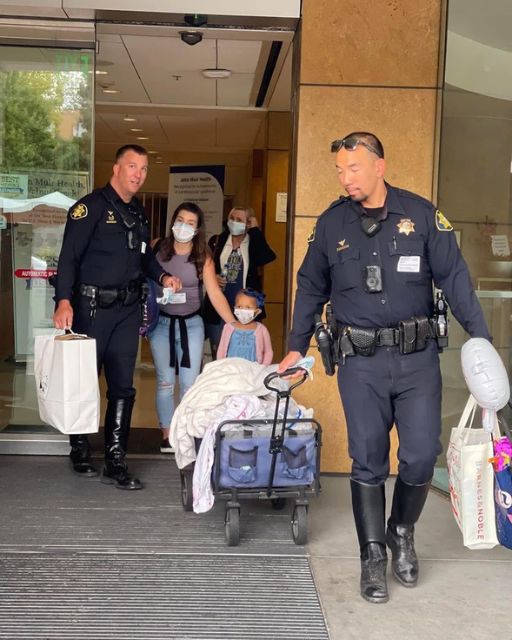When the nurses finally told us we could go home, I expected to feel relief—a sense of release after endless months of sterile hallways, IV drips, and prayers whispered through clenched teeth. But as I stood there beside my daughter Callie, clutching our bags and forcing a smile, all I felt was emptiness.
Callie beamed behind her little mask, waving goodbye to the nurses like they were lifelong friends. Her beloved stuffed bunny peeked from under one arm, her spirit so full of joy it almost hid the harsh truth: we had no home to return to. The apartment was long gone—traded away for months of unpaid rent and sleepless nights in a stiff vinyl hospital chair. My job had vanished after too many “we understand” calls turned into silence. And Callie’s father? He disappeared the moment life asked more of him than he was willing to give.
Still, I held myself together. I always did. I braided her thinning hair, tied on cheerful scarves, let her pick out balloons we could never afford. I smiled through the exhaustion because she needed courage, not sorrow.
Standing in the hospital lobby with our lives crammed into two duffel bags, I saw two uniformed police officers walking toward us. My heart stuttered. Had the hospital reported our debts? Was something wrong with the insurance? But a nurse leaned in and whispered gently, “It’s okay. They’re here to help.”
Help. The word felt so unfamiliar I didn’t know how to accept it.
The officers offered to carry our bags and escort us to a “temporary placement.” I didn’t ask questions—I didn’t have the energy for answers. I simply nodded and followed, numb, pretending all of this was normal.
We walked out as if we were just another family going home—if you ignored the weight in my chest and the aching void where “home” should have been. As I climbed into the van, the younger officer handed me a plain envelope. White. Soft ink in the corner marked just one name.
“Don’t open it until you’re inside,” he said, his voice kind.
I sat with it resting in my lap, its weight far heavier than the paper should have allowed. Callie tugged my sleeve, her voice sweet with hope. “Mommy, can we get ice cream?”
I blinked, surprised by her innocence. I didn’t have the heart to say we couldn’t afford even a single scoop. “Maybe later,” I whispered. “Let’s see where we’re going first.”
The van moved quietly through the city—past alleys and cafés and strangers who had no idea how close we were to falling apart. Callie pressed her nose to the window, mesmerized by every passing car, every storefront, every dog. Her joy softened something in me.
But I couldn’t stop thinking about the name on the envelope.
Derek Monroe.
I hadn’t said it aloud in nearly a decade. Not since life carved a canyon between us, and pride kept it wide. My brother.
The van turned onto a quiet street, lined with pastel houses and swaying porch swings. We stopped in front of a modest blue home with white shutters. A woman with silver-streaked hair stood on the porch, calm and kind.
“This is your placement,” the officer said. “Mrs. Harper will help you get settled.”
I stepped out, stunned. Mrs. Harper welcomed me like I was someone she’d been waiting for all along. She lifted the bags from the van with the gentle grace of someone used to holding burdens that weren’t hers.
Before I could speak, the officer nodded at the envelope. “Go ahead. Open it.”
With trembling fingers, I tore it open. Inside were a house key, a folded letter, and a single note on a card.
This isn’t charity. This is family.
Go to 427 Maple Street.
Everything will make sense there.
—Derek
I couldn’t breathe.
He knew.
Somehow, Derek had found out about Callie. About everything. He knew I’d never ask for help—so he stepped forward first.
The letter explained it all. He’d bought the house years ago, just in case. He’d followed our journey from a distance—through mutual friends, through quiet updates. And when he heard we’d be discharged with nowhere to go, he made one phone call that changed everything.
No rent. No expectations. Just love.
“I wasn’t there when you needed me most,” he wrote. “But I’m here now. Please… let me in.”
I pressed the letter to my chest as tears ran down my cheeks. Mrs. Harper returned with lemonade and cookies, like it was the most ordinary day in the world. She sat beside me and said, softly, “Your brother’s a good man. All he wants is for you to be safe.”
That night, Callie curled into a soft bed, lavender-scented sheets tucked around her, bunny nestled under her chin. “Mommy,” she whispered, “is this our new home?”
I nodded, voice thick with emotion. “Yes, baby. It is.”
The days that followed were slow, like learning to breathe again after drowning. Derek started small—texts, short visits. Then he came over with pizza and board games, and Callie clung to him like he’d always been there. Watching them together, hearing their laughter, something inside me began to mend.
With his help, I found a part-time job at a nearby bookstore. Callie went back to school. And each evening, we sat on the porch, watching the sun melt behind the trees, sipping peace we thought we’d never taste again.
One night, Derek looked at me and said, “You were never truly alone. You just needed someone to remind you.”
I smiled, tears warming my eyes. “I’m glad it was you.”
If you’re reading this and trying to carry everything on your own—don’t. Someone out there is ready to help. Let them in. And if you’re someone who can help—don’t wait to be asked.
Because sometimes, all it takes is one envelope to change everything.
And sometimes, that envelope leads you home.
